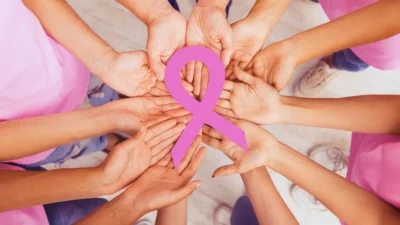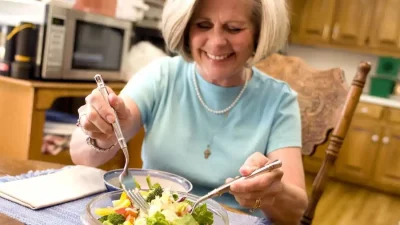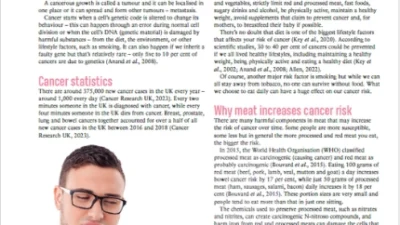Breast cancer
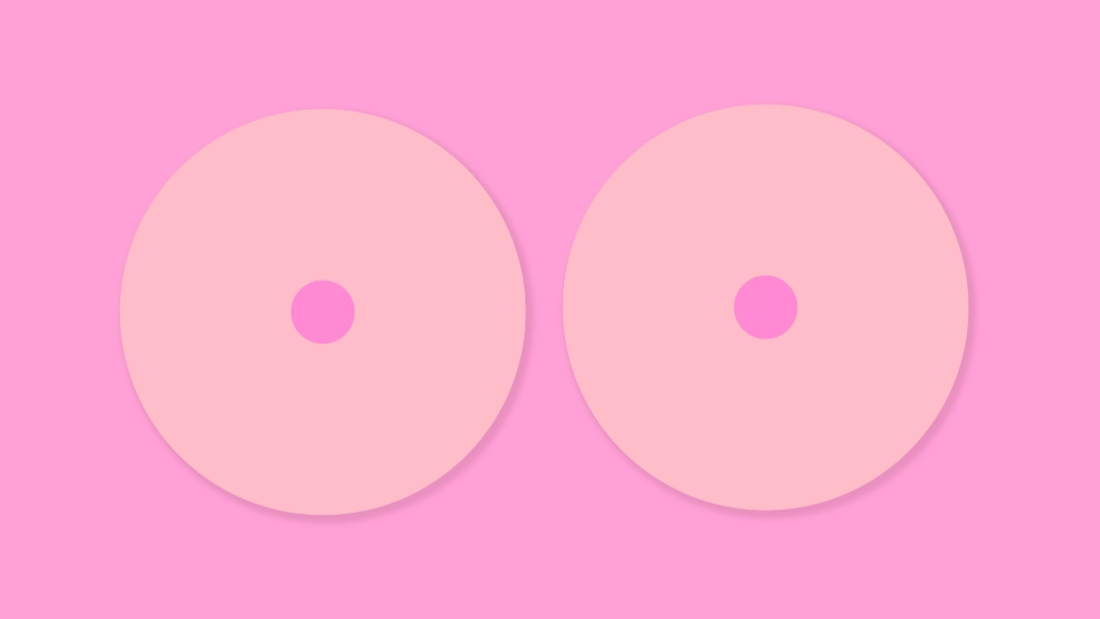
Breast cancer is scary but there’s plenty you can do to reduce your risk.
Breast cancer develops when abnormal cells in the breast start to grow and reproduce uncontrollably, creating a growth called a tumour. It is the second most common cancer in the UK, recently overtaken by prostate cancer, and although it mainly affects women, men can have it too; around 400 men are diagnosed each year in the UK compared to around 56,000 women.
Not every lump in the breast is a tumour – it’s normal for breast tissue to change throughout your cycle, from soft to lumpy, depending on hormone levels. Knowing your body is important so you can spot any irregular changes.
Most cases (70 to 80 per cent) of breast cancer are hormone-sensitive, which means their growth is stimulated by sex hormones. These are also called hormone receptor positive breast cancers. However, some breast cancers are hormone receptor negative and do not respond to hormones or the lack of.
One in seven women in the UK will develop breast cancer during their lifetime and diet and lifestyle play a big role. Of course, genetics may increase your overall risk but even if you have the gene mutations that are considered high-risk, it doesn’t mean that you’ll develop breast cancer. Only five to 10 per cent of breast cancers are caused by faulty genes.
Breast Cancer UK estimates that at least 30 per cent of breast cancer cases in the UK could be prevented by making lifestyle changes. That includes a healthy diet, physical activity, not smoking, drinking alcohol only occasionally and maintaining a healthy weight.
Other factors that play a role include exposure to environmental pollutants, chemicals in personal care and household products, age and ethnicity – white and Ashkenazi people have a higher risk.
Diet plays a big role in your breast cancer risk and avoiding certain foods can significantly reduce it. See why you should cut these foods out of your diet.
Some foods can not only slash your risk of breast cancer but they also boost your overall health. See why these foods should be a part of your daily diet.
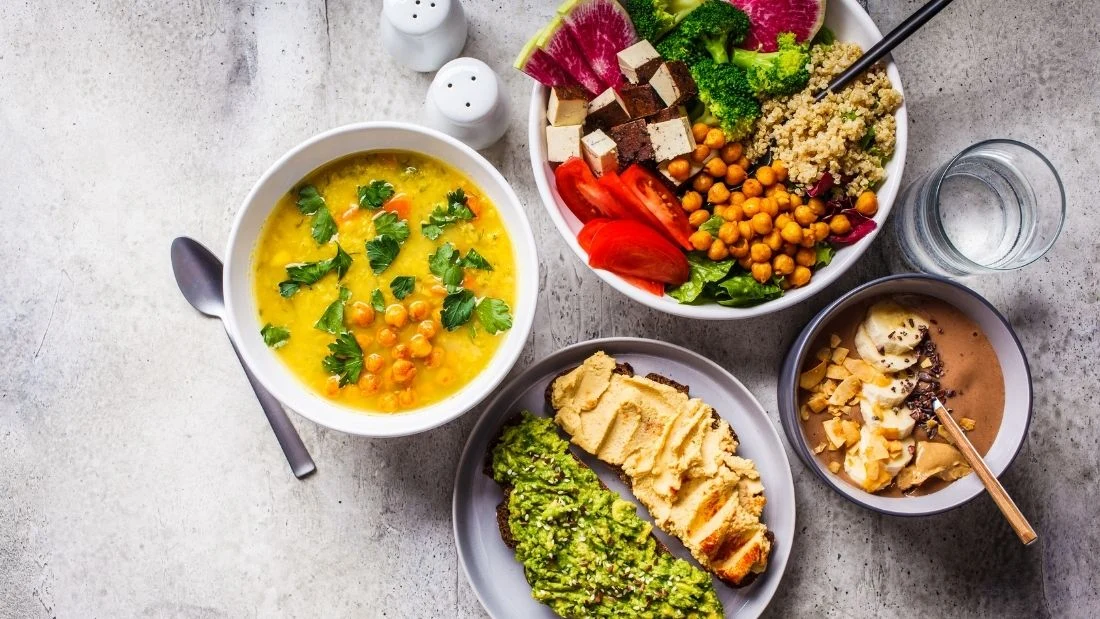
A major review of studies on lifestyle and breast cancer concluded that to lower our breast cancer risk, we should eat a healthy diet rich in fruits, vegetables, wholegrains and cereals, avoid red and processed meat, alcohol and smoking – and try to maintain a healthy weight and be physically active.
Other research went a step further and highlighted that a healthy vegan diet can dramatically cut your risk of breast cancer because it hugely reduces your exposure to carcinogens (cancer-causing compounds) and, at the same time, is rich in antioxidants, phytochemicals and fibre, which protect your cells and DNA from damage, support your immune system and reduce inflammation – all these factors result in a lower risk of cancer.
One recent review summarised the positive impact of plant wholefoods – as their proportion in your diet increases, the risk of breast cancer decreases. On the other hand, the more animal products and processed foods you eat, the higher the risk. Whole plant-based foods include fruits, vegetables, wholegrains, pulses, nuts and seeds. It may seem too simple but other studies show the same results.
It’s important to note that a breast cancer risk-lowering vegan diet should be healthy – as science shows, a healthy vegan diet can truly reduce your risk, while an unhealthy vegan diet (based on junk foods, sugary and processed foods) may increase your risk.
Now you know that a wholesome vegan diet can lower your breast cancer risk, you’re probably curious about what you should eat daily based on the recommendations above.
Here are your five simple guidelines to follow:
- Every day, eat at least two portions of wholegrains – wholemeal bread, oats, whole wheat pasta, brown rice or quinoa
- Have at least one soya, lentil, chickpea or bean-based meal daily – and season it with garlic (and turmeric if appropriate); think tofu, edamame, lentil soup, dhal, bean salad, bean dip, bean stew, falafel, hummus etc.
- Choose your fruit and veggies – eat a portion dark green leafy vegetables every day and some berries (frozen will do nicely); aim for at least five portions of fruit and veggies daily
- Snack on nuts or use nut butters – a handful of nuts or a tablespoon of nut butter daily is a smart choice but you can easily double that if it suits your needs
- Drink tea and treat yourself to quality dark chocolate – green and black tea are the best tea choices; your dark chocolate should be at least 70 per cent cocoa to supply a good dose of polyphenols
These guidelines are easy to stick to and still leave plenty of room to accommodate your individual preferences. Just make sure the rest of the foods you eat isn’t all processed and don’t wash it down with sugary drinks – that would undo most of the benefits!
See what a balanced vegan plate and a balanced vegan meal plan looks like.
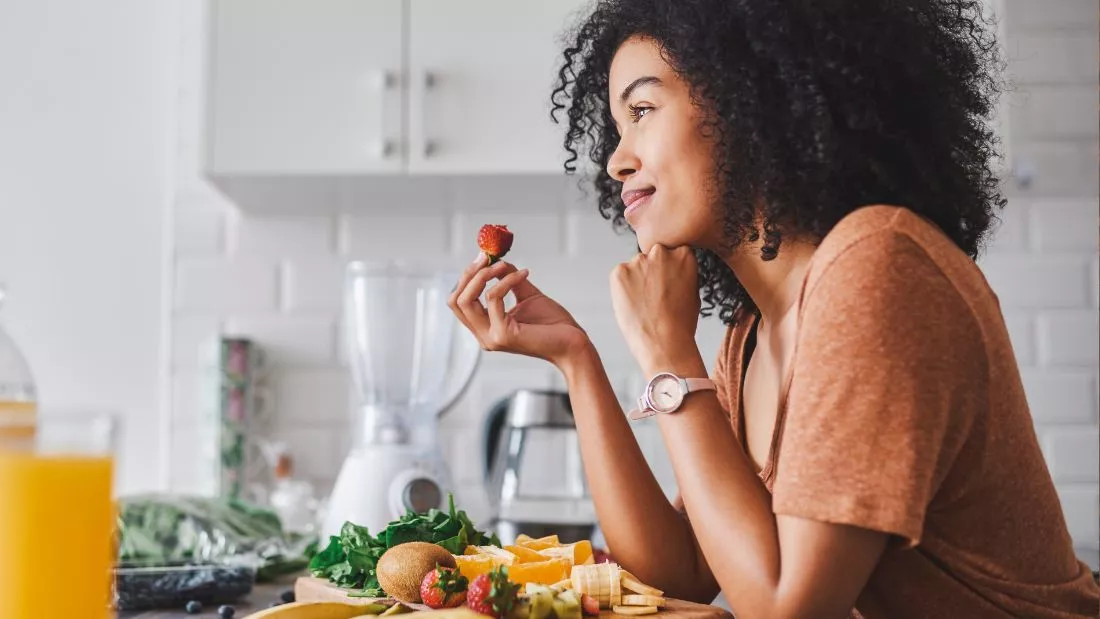
If you or your loved one have been diagnosed with breast cancer and wonder if changing your diet can affect your outcome – there’s a good chance it could help. Of course, this depends on many factors and breast cancer stage but diet can play a big role and may improve your health and support your treatment.
Clinical trials show that a wholefood plant-based diet improves health of breast cancer patients in many ways and improves several major health markers. It is not a cure but it may help improve your quality of life and research suggests it may improve your prognosis.
When it comes to soya intake in breast cancer patients, it is considered safe and, according to scientific studies, may improve your treatment outcomes and may even lower the risk of cancer recurring.
A balanced vegan diet is certainly to be recommended to breast cancer patients – it may help but it certainly won’t cause any harm or negatively affect your outcome. Often, cancer patients are encouraged to ‘just eat’ because cancer treatment is harsh and can affect your appetite but a diet based on animal products, processed and sugary foods makes your body work harder and increases inflammation. Eating a healthy plant-based diet is always better than milkshakes and burgers.
Diet is important in reducing your cancer risk but there are other factors at play, too. Some of them increase your risk of the disease and you cannot change them, such as age, gender, starting your periods before the age of 12, late menopause (after the age of 55), family history, certain diseases and ethnicity.
However, there are other factors that you can change, so it’s best to focus on those. They include smoking, obesity and alcohol consumption. It may not be easy to change your habits but as this trio increases the risk of many diseases, including other major killers, such as heart disease, diabetes and cancer, don’t hesitate to ask for help and try your best to adopt a healthier lifestyle.
There’s also a small increase in breast cancer risk from taking contraceptive pills and combined hormone replacement therapy (oestrogen and progestogen) but it’s best to discuss this with your doctor.
Avoiding certain chemicals, often present in cosmetics, toiletries, household and industrial products and even children’s toys, can reduce your breast cancer risk. These chemicals include parabens (E215, E216, E218, E219), phthalates, triclosan, some UV filters (eg octocrylene), flame retardants, PFAS, PFOA and PTFE – they affect your hormones and are known as endocrine disrupting chemicals. For a detailed list of these chemicals, visit this page.
Nothing can shield you from breast cancer 100 per cent but there’s a lot you can do to minimise your risk. Eating a healthy vegan diet, being physically active, maintaining a healthy weight, drinking alcohol only occasionally (or not at all), avoiding certain chemicals and breastfeeding your child if possible are important factors that together may greatly lower your risk.




